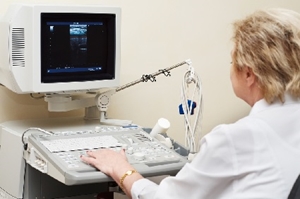
If your OB/GYN hasn’t already talked to your about your first trimester screening
, then you can expect to have the discussion soon while you’re still in the early stages of pregnancy. According to the Mayo Clinic, this evaluation is optional and noninvasive.
For the test, a practitioner will use the results of a maternal blood sample as well as an ultrasound of your baby to determine the risk you have of delivering a child with specific abnormalities such as Down syndrome/trisomy 21 and trisomy 18.
While evaluating your fetus during the ultrasound, other significant fetal abnormalities may also be identified such as cardiac disorders and cystic fibrosis.
The test is completed between weeks 11 and 13, providing your physician with the most accurate results. This is a safe test that presents no known risks or side effects to either you or your baby, the Mayo Clinic said.
Is it effective?
The first trimester screening is the most accurate noninvasive screening method available, the Mayo Clinic stated. The combined accuracy rate for the screening is approximately 85 percent.
Keep in mind that there is a false positive rate of 5 percent, which means that your doctor may request further testing be done.
According to the source, this means that nearly 85 out of every 100 babies with abnormalities will be identified during the screening. If you do get a positive test, it means that you’ll have a 1/100 to 1/300 chance of delivering a child with one of the abnormalities, Down syndrome/trisomy 21 or trisomy 18.
The important thing to remember with this test is that the first trimester screening doesn’t diagnose a problem.
Details of the test
When they take your blood, they’ll measure the pregnancy hormones hCG and PAPP-A while the ultrasound will look at the nuchal translucency, or the fluid beneath the skin behind your baby’s neck.
Once they have both your hormone levels and the nuchal translucency of your baby, they’ll use your age to determine risk factors for Down syndrome and trisomy 21.
The blood screen takes approximately 10 minutes to complete after its sent to the lab for testing. Then the ultrasound specialist or perinatologist will take up to 40 minutes to look at the nuchal translucency. After that, the Mayo Clinic said that the results are calculated within a week.
When you get the results back, you won’t get the specifics. Rather, they’ll tell you if your results were normal or abnormal and give you a risk level, such as 1/650 or 1/1,500.
Down syndrome/trisomy 21
Down syndrome is the most common birth defect in the U.S. and occurs in one in every 800 infants, according to the Mayo Clinic. There are more than 350,000 people living in the U.S. with Down syndrome.
The source stated that more than 90 percent of Down syndrome cases are caused by trisomy 21, which means there are two chromosome 21s. Less common causes of Down syndrome include mosaic trisomy 21 and translocation trisomy 21.
The age of the mother is a significant risk factor for having a baby with Down syndrome/trisomy 21.
Trisomy 18
Trisomy 18 is also known as Edwards syndrome and typically occurs within one of every 2,500 pregnancies, according to the Trisomy 18 Foundation. The issues that are caused by this defect have complications that are more life-threatening.
The Trisomy 18 Foundation stated that most of the babies born with trisomy 18 are admitted to the neonatal intensive care unit. As many as 50 percent of babies who are identified as having trisomy 18 are stillborn and boys have a higher stillbirth rate than girls.
There are three types of trisomy 18: full, partial and mosaic. According to the foundation, the most common type is full trisomy 18 and occurs in about 95 percent of all cases. With this type of trisomy 18, it means that there is an extra chromosome in every cell of the baby’s body. This condition is not hereditary, so parents cannot be carriers unlike Down syndrome, and it cannot be the result of something the parents did before or during the pregnancy. It is just something that happens.
The Trisomy 18 Foundation said that typical characteristics of this defect include heart defects, kidney problems, excess amniotic fluid, clenched hands, delayed growth, a strawberry-shaped head, severe developmental delays and an umbilical or inguinal hernia.
Although this test sounds scary, it can help you better prepare for the arrival of your child if an abnormality were to be identified, but your doctor will walk you through any additional stages if they find them necessary.
If you have questions about your first prenatal OB visits, or just need a reminder checklist of important questions to ask, download our free Guide to Prenatal OB visits. Just click below.



Leave a Reply